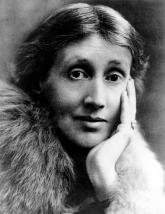
Biographie de Virginia Woolf
London-born Virginia Woolf came from a wealthy family and, unlike her brothers, received her education at home, an unusual step for the times. Her parents had both had children from previous marriages, so she grew up with a variety of siblings, stepbrothers and stepsisters. Her father was a well-respected editor and author and the former son-in-law of William Makepeace Thackeray. Author James Russell Lowell was her godfather, and Henry James and George Elliott were regular visitors and guests at the family home.
As she recalled later in life, her most pleasant childhood memories were of the summers spent at the family home in Cornwall, by Porthminster Bay (the Godrevy Lighthouse there was the basis for her novel "To the Lighthouse").
The sudden death of Virginia's mother in 1895, when she was 13, and the passing of her sister two years later led to the first of Virginia's mental breakdowns. In 1904 her father died, which caused a complete mental and physical collapse and for a while she was sent to a mental institution to recover.
Nervous breakdowns and bouts of severe depression tormented Virginia throughout her life, and the fact that as children she and her sister Vanessa were sexually abused by two of their stepbrothers added to her already considerable feelings of guilt and inferiority.
She studied at London's Kings College, where she became acquainted with such literary figures as Lytton Strachey, Saxon Sydney-Turner and Leonard Woolf.
She married Woolf in 1912. Virginia was always ashamed of what she termed her "unattractive countenance", and once wrote that "being wanted [was] a pleasure that I have never felt". In 1922 she met Vita Sackville-West, the two women began a relationship that lasted for almost ten years. She was said to have written her novel "Orlando" as a love letter to West.
After the publication of her novel "Between the Acts" she fell into a deep depression, exacerbated by the destruction of her London home by Nazi planes during the bombing of that city, and the less than enthusiastic critical reaction to her biography of her close friend Roger Fry.
Her condition deteriorated to the point where she was unable to write or even read. She finally had a full-blown nervous breakdown. Unable and unwilling to continue, she wrote a note to her husband saying that "I am certain I am going mad again" and "I shan't recover this time .
